Effects of hydraulic fracturing or fracking.
Hydraulic fracturing, also known as fracking in the Anglo-Saxon world, is a term that refers to a type of extraction of natural gas and oil from the fracture of bedrock in the subsoil. In order to extract the gas that is trapped in the rocks, a technique of mixed drilling is used, wherein the first place it is possible to drill up to about 5000 vertical meters, and then drilled between two to five kilometers horizontally. Once drilled in this way, it is passed to make an injection of water along with sand in a percentage of 98%, including certain chemical additives that make up the remaining 2%, all of it is injected at a high pressure.
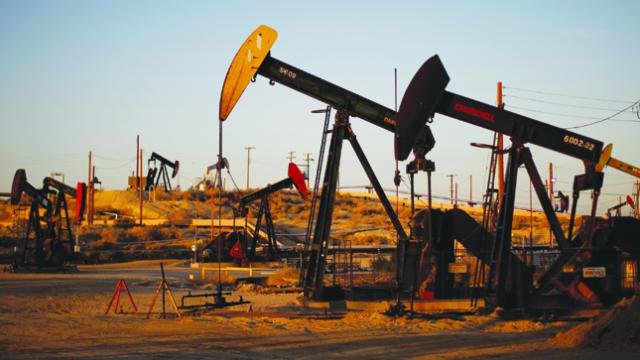
Source
This process causes the bedrock to suffer a fracture and the gas accumulated inside it to be released, ascending to the surface through the well prepared for this purpose. The procedure is repeated throughout the vein of the rock with a rich gas content. A part of the mixture that has been injected into the vein, usually returns to the surface, in a percentage that can range from 15 to 85%.
Years ago, this technique was in operation in 60% of the extraction wells that were used, but due to the rise in the prices of fossil fuels, this type of techniques have become more economically profitable. what has increased its use with respect to other methods?
Similar methods in the extraction of product through injections in the stone were carried out as early as 1860, in North America, but those techniques used nitroglycerin. In later years the explosive products were changed to acids, but it was in 1949 when water was first used in the injection. The water was mixed with sand so that when the water pumping stopped, the cracks would not be closed, and the added additives are chemical substances that will prevent the gas or oil from being contaminated during its trip to the outside.
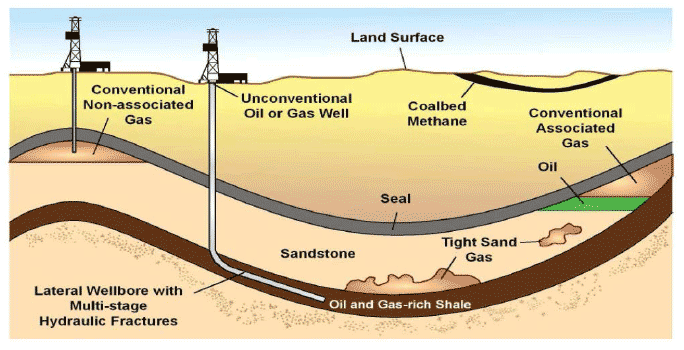
Source
The United States was the country that first used the technique of hydraulic fracturing, and that is why it is taken as a reference to know and study the possible negative effects on the environment that this procedure could generate. Although numerous studies and accusations have been made, the main danger is the emission into the atmosphere of contamination, as well as the possible contamination of groundwater by some leaks of the process fluids, in addition to uncontrolled discharges of water with waste abroad. Fluids and water from hydraulic fracturing can contain substances that are dangerous, and traces of heavy metals or even radiation from the subsoil, so they are processes that must have an exhaustive control. Even near the extraction wells, contaminations have been detected in groundwater based on methane, or potassium chloride, which produces, in drinking water, high salinization.
Each country has its regulations about these procedures, but there is great controversy about the effects of these techniques, as it is also known that the number of earthquakes increases and the chemical additives can contaminate the soil and natural aquifers they find underground. Numerous studies have shown that the earthquakes provoked by these methods are of very low magnitude and that contamination can be controlled if a correct and controlled procedure is carried out, which is why it is still a feasible and highly used practice at present.
In addition to the confirmation of several scientists around the world, that the process of hydraulic fracture called fracking causes earthquakes, there is a list of side effects of all kinds, which is increasing day by day in a worrying way.
It is undeniable that the process generates jobs, natural gas, oil and huge profits, for which it is defended by companies and supported by many governments, but the environmental, health and safety hazards continue to increase.
This is a summary of the various "side effects" that could be caused by drilling a hole in the surface of the earth, in which toxic chemicals are injected at a high pressure and then the wastewater is pumped at a great depth.
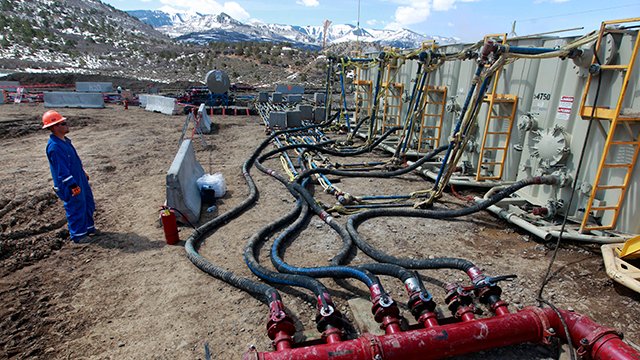
Source
- Water contamination.
During the process of hydraulic fracturing, a significant amount of methane gas and other toxic chemicals seep from the well and contaminate the vicinity of groundwater, which is often the water source for consumption by local communities.
A single well can produce almost four million liters of wastewater, which contains radioactive elements such as radio and various carcinogenic hydrocarbons, such as benzene; Methane concentrations are 17 times higher in groundwater near the fracture sites than in normal wells. Only between 30 and 50% of the fracturing fluid recovers; the rest is left on the ground and is not biodegradable.
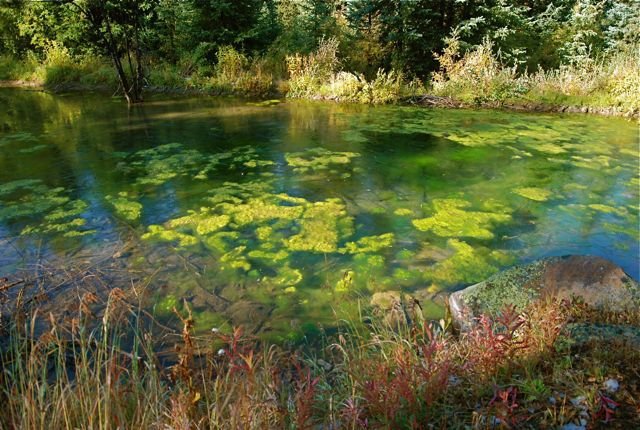
Source
- Water scarcity.
Almost 90% of the water used in fracking never returns to the surface. Since water is definitely removed from its natural cycle, this is bad news for those affected by drought or shortages.
Reorienting water supplies for the hydraulic fracture industry not only makes water prices more expensive, it also reduces the availability of water for other uses, such as crop irrigation.
- Serious consequences in health.
The residual fluid left by the hydraulic fracturing process is deposited in open pits to evaporate, which releases dangerous volatile organic compounds into the atmosphere, contaminating the air, generating acid rain and increasing ground-level ozone levels.
Exposure to hydrogen sulfide particles and volatile hydrocarbons can cause health problems such as asthma, headaches, high blood pressure, anemia, heart attacks and cancer and can have a detrimental effect on the immune and reproductive systems, as well as in embryonic development.
- A killer gas.
A recent study by Johns Hopkins University found that homes located in suburban and rural areas near the sites of hydraulic fracture, in general, have a concentration of radon 39% higher, than those located in urban areas without fracking.
Radon (the second world cause of lung cancer after smoking) is a natural, odorless, tasteless, invisible and soluble radioactive gas, so some dissolved remains can appear in water wells and underground water and other dispersed by air.
- Deadly particles.
In addition to water and toxic chemicals, fracking requires the use of fine sand or frac, which has driven the boom in the extraction and grinding of it, in many parts of the planet.
These small particles of silica can make breathing difficult and cause respiratory irritation, cough, obstruction of the ways and poor lung function, but chronic or long-term exposure can cause lung inflammation, bronchitis, emphysema and a serious illness known as silicosis, a form of pulmonary fibrosis.
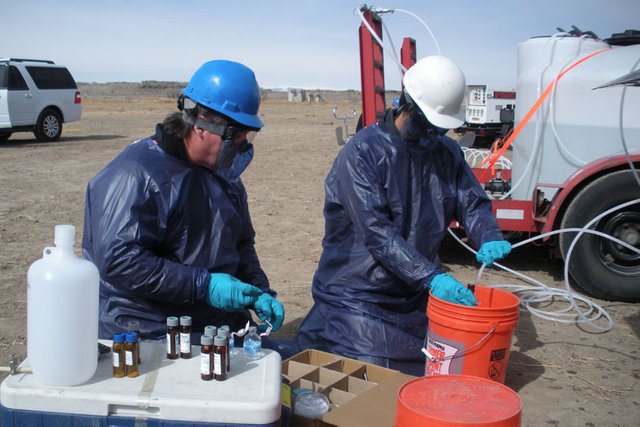
Source
- Earthquakes.
It has been confirmed that the process of hydraulic fracture causes earthquakes. Specifically, during the last seven years, certain geologically stable regions have experienced movements in the faults that had not moved in millions of years, because of fracking. In addition, it is difficult or impossible to predict where the earthquakes caused by this practice will occur.
It is convincingly proven that the increase in this activity coincides with the injection of wastewater into wells designed and approved for this purpose. After years of uncertainties, many governments have ended up giving reason to scientists, that of France was one of the first.
- More "greenhouse effect"?
Natural gas is mainly methane, a powerful greenhouse gas that traps 85 times more heat than CO2. Due to methane leaks during the hydraulic fracturing process, fracking can be worse than burning coal.
It is proven that even small leaks in the production and distribution system of natural gas can have a great impact on the climatic level, enough to destroy the benefit of switching from the production of thermal energy by coal to gas.
Last but not least, behind the fracking, there is a lot of money at stake. We speak of astronomical quantities that end up "convincing" governments to accept that their territories are trampled in this way, even knowing the pernicious consequences that this method can bring.
In exchange for a few real jobs, but not always stable, to have a source of natural gas "at home" and surreptitious economic support, in many parts of the world, at this moment is fracking, without any consideration for the health of the nearby inhabitants, the terrible climatic consequences and the irreparable damages to the Environment.
References
- https://en.wikipedia.org/wiki/Environmental_impact_of_hydraulic_fracturing
- https://www.epa.gov/uog/process-unconventional-natural-gas-production
- https://www.livescience.com/34464-what-is-fracking.html
- https://fracfocus.org/hydraulic-fracturing-how-it-works/hydraulic-fracturing-process
- https://www.nationalgeographic.org/media/how-hydraulic-fracturing-works/
Good article, important that everyone knows the harmful effects of this procedure ...